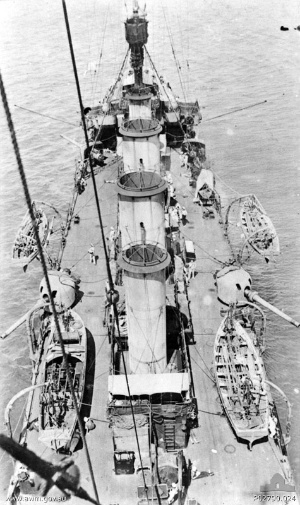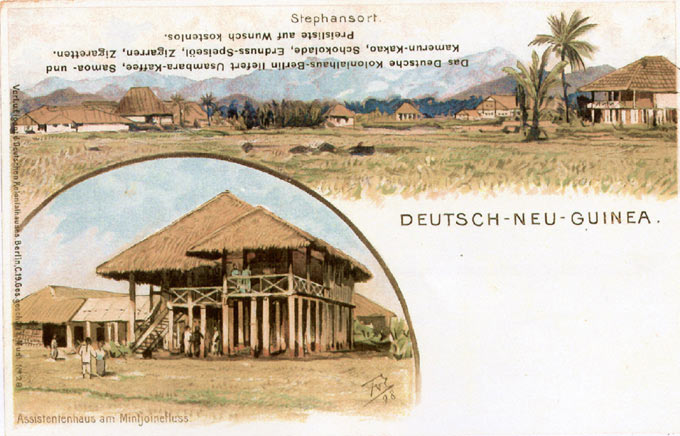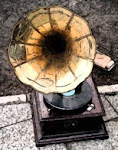 Melbourne is our head-quarters and our depot, and while we were in Melbourne, I was sent to depot to go through the Gunnery School for “Gunlayer”. I was one of the first two classes of Gunlayers put through in Australia. I stayed in the depot and working in small boats in the Bay from March until July, when I was sent round to Sydney to join the “Sydney” which was getting ready for a cruise up the Queensland coast and the Islands (Pacific Is.) then with the Fleet it was intended to visit New Zealand, then the “Sydney” had a chance, (although it wasn’t decided which ship would go) of getting the trip for the opening of the Panama Exposition, the war spoilt a lot of good times for us, anyway we left Sydney on July 21st for Queensland and went into a small port named Gladstone and then we proceeded to Townsville (N. Queensland) it is a fine little town, semi-tropical and very progressive; when things began to get very warm in Europe, we were showing visitors and school-children round the ship and having altogether a good time, then we started getting rumours and buzzes then the order to fill up with provisions, coal etc., as soon as possible and proceed to Thursday Island for orders, then the fun, or should I say the work began, taking in at Queensland, canned meat all night, and getting as much coal as we could under all kinds of difficulties,
Melbourne is our head-quarters and our depot, and while we were in Melbourne, I was sent to depot to go through the Gunnery School for “Gunlayer”. I was one of the first two classes of Gunlayers put through in Australia. I stayed in the depot and working in small boats in the Bay from March until July, when I was sent round to Sydney to join the “Sydney” which was getting ready for a cruise up the Queensland coast and the Islands (Pacific Is.) then with the Fleet it was intended to visit New Zealand, then the “Sydney” had a chance, (although it wasn’t decided which ship would go) of getting the trip for the opening of the Panama Exposition, the war spoilt a lot of good times for us, anyway we left Sydney on July 21st for Queensland and went into a small port named Gladstone and then we proceeded to Townsville (N. Queensland) it is a fine little town, semi-tropical and very progressive; when things began to get very warm in Europe, we were showing visitors and school-children round the ship and having altogether a good time, then we started getting rumours and buzzes then the order to fill up with provisions, coal etc., as soon as possible and proceed to Thursday Island for orders, then the fun, or should I say the work began, taking in at Queensland, canned meat all night, and getting as much coal as we could under all kinds of difficulties, then we started our trip through the “Great Barrier Reef” for “Thursday Island” (Thursday Is or Port Kennedy is the most northerly point of Australia). On our way through the Reef we got by wireless the news that we had declared war, the skipper gave us the news from the bridge (a fine fellow our skipper) we all gave a good cheer and from that time until we smashed the “Emden” we were just itching to smash something or to be smashed ourselves in the attempt.
then we started our trip through the “Great Barrier Reef” for “Thursday Island” (Thursday Is or Port Kennedy is the most northerly point of Australia). On our way through the Reef we got by wireless the news that we had declared war, the skipper gave us the news from the bridge (a fine fellow our skipper) we all gave a good cheer and from that time until we smashed the “Emden” we were just itching to smash something or to be smashed ourselves in the attempt.
Image of HMAS Melbourne and map of Great Barrier Reef via Wikipedia
 They had a gig wireless station on the island, but it was too far inland for us to take it then and I suppose we had other work on, so we left that day until we got land troops and took possession properly, that was nearly a month after, so it gave the Germany plenty of time to defend the wireless stations, but I must proceed to tell you my wanderings before we came back to take possession. There are so many islands in this part of the Pacific that it is easy for a ship to hide away, so, after leaving Simpson Haven, we steamed slowly through the Solomon Group of Islands, which was a fine trip, although we were having spasms all the time, taking trees for masts of ships, etc.,
They had a gig wireless station on the island, but it was too far inland for us to take it then and I suppose we had other work on, so we left that day until we got land troops and took possession properly, that was nearly a month after, so it gave the Germany plenty of time to defend the wireless stations, but I must proceed to tell you my wanderings before we came back to take possession. There are so many islands in this part of the Pacific that it is easy for a ship to hide away, so, after leaving Simpson Haven, we steamed slowly through the Solomon Group of Islands, which was a fine trip, although we were having spasms all the time, taking trees for masts of ships, etc., we were on our way to Rossel Is. for coal and oil, we coaled in a great reef with the entrance facing the island, we there met the Melbourne, for the first time since the outbreak of the war; from Rossel Is. we made for Sandy Cape, off the coast of Queensland, we picked up a transport there loaded with troops formed in Sydney, she was the “Berrima” one of the latest P. & O. Branch Boats, we escorted her into a small harbour at Palm Is. further north of Queensland. We then went into Townsville for
we were on our way to Rossel Is. for coal and oil, we coaled in a great reef with the entrance facing the island, we there met the Melbourne, for the first time since the outbreak of the war; from Rossel Is. we made for Sandy Cape, off the coast of Queensland, we picked up a transport there loaded with troops formed in Sydney, she was the “Berrima” one of the latest P. & O. Branch Boats, we escorted her into a small harbour at Palm Is. further north of Queensland. We then went into Townsville for  coal, provisions, etc., after we had got all ready for sea again, we all went for a route march through Townsville, we stopped in batches at two hotels and were allowed to have one drink, only one, of course, and as many more as you could get in the time allowed, it was very hot weather you know, and we marched back to the ship singing songs and all happy and satisfied. We then returned to Palm Island and as we were waiting orders, we had a fairly easy time for a couple of days, there were a few seining (fishing) parties; while at Palm Is. we picked up our two submarines and together with the transport, we proceeded to Port Moresby, British New Guinea. We there met another transport the “Kanowna” which had been formed in
coal, provisions, etc., after we had got all ready for sea again, we all went for a route march through Townsville, we stopped in batches at two hotels and were allowed to have one drink, only one, of course, and as many more as you could get in the time allowed, it was very hot weather you know, and we marched back to the ship singing songs and all happy and satisfied. We then returned to Palm Island and as we were waiting orders, we had a fairly easy time for a couple of days, there were a few seining (fishing) parties; while at Palm Is. we picked up our two submarines and together with the transport, we proceeded to Port Moresby, British New Guinea. We there met another transport the “Kanowna” which had been formed in Queensland, she was ordered with us to Rossel Is. again, but on our way something went wrong with her and our skipper ordered her to proceed to Townsville and disband, we carried on to Rossel Is., we then picked up the remainder of the Fleet, and went to Rabaul again, landed troops and after quite a few exciting spasms took possession of G. N. Guinea and Bismark Archipelago. While we were there, we lost a submarine A.E.1 with all hands. We were ordered to Sydney, but we first steamed up the coast in search of the submarine.
Queensland, she was ordered with us to Rossel Is. again, but on our way something went wrong with her and our skipper ordered her to proceed to Townsville and disband, we carried on to Rossel Is., we then picked up the remainder of the Fleet, and went to Rabaul again, landed troops and after quite a few exciting spasms took possession of G. N. Guinea and Bismark Archipelago. While we were there, we lost a submarine A.E.1 with all hands. We were ordered to Sydney, but we first steamed up the coast in search of the submarine.
Image 1, painting of Pomonahaven, New Guinea by Frank Bukacs via TraditionsverbandImage 2, HMAS Melbourne via Wikipedia
Image 3, painting of Apia, Samoa by Frank Bukacs via Traditionsverband
Image 4 painted by Themistokles von Eckenbrecher, German New Guinea via TraditionsverbandInternational colonial interests claimed much of the land of the Pacific. In New Guinea, the main parties were Britain, Japan and Germany. The sustainable production of the indigenous inhabitants was disrupted to produced plantations for export. In German tropical colonies, Coffee, cocoa, tobacco and peanuts were grown for export around the globe, as can be read in the painting by von Eckenbrecher (upside down at the top), where a pricelist is offered free of charge. Control of the colonies meant control of the supplies of resources.(ed.)
 Early in the morning we got a good laugh, although we were all a bit mad over losing our submarine, we spied a small boat under sail and oars, pulling for their lives, as we bore down upon them, we fired round the boat with a rifle, and, lo, about sixteen niggers dived into the “ditch” and although it was miles away from civilisation and foreign at that, one of the nigs shouted “Why you shoot, Sar?” “Me missionaire boat, Sar.” Anyway all hands nearly burst with laughter at the antics of the nigs, we let them get into their boat again and shove off.
Early in the morning we got a good laugh, although we were all a bit mad over losing our submarine, we spied a small boat under sail and oars, pulling for their lives, as we bore down upon them, we fired round the boat with a rifle, and, lo, about sixteen niggers dived into the “ditch” and although it was miles away from civilisation and foreign at that, one of the nigs shouted “Why you shoot, Sar?” “Me missionaire boat, Sar.” Anyway all hands nearly burst with laughter at the antics of the nigs, we let them get into their boat again and shove off.
In this section the actions and words of the sailors convey to us the attitudes which were prevalent at the time in the meeting of cultures, in particular with indigenous cultures. Policies in Australia included the White Australia Policy and the Pacific Island Labourers Act.
Racist attitudes in the population co-exist commonly with colonialist foreign policy. In order to take people's land and make them work it for the purposes of others, an attitude of superiority and rightful domination is helpful. Deprecating forms of address such as "nigger" or "nig" correspond to the "sir" of the subordinated person. Attitudes of national superiority characterised the nationalism at the beginning of the twentieth century and laid the basis for war in the popular will. Struggle for resources was the economic basis for colonialism.
In an authoritarian system such as a war ship, within the rules of a hierarchical society such as Britain, it is not surprising that the sailors, those at the bottom, get some joy from harassing the indigenous people they encounter, someone "below them".
Mistreatment of indigenous people has been common and often brutal in the Pacific, including the mistreatment of black Australians (Aborigines and Torres Strait Islanders) as their land and human / cultural rights were expropriated. Although "in nineteenth-century literature, there are many uses of the word nigger with no intended negative connotation", it is clear in this account that not just the words but the collective actions of the sailors' culture are racist. They would not have done the same thing in Sydney Harbour to a boatload of British men.
Although "in nineteenth-century literature, there are many uses of the word nigger with no intended negative connotation", it is clear in this account that not just the words but the collective actions of the sailors' culture are racist. They would not have done the same thing in Sydney Harbour to a boatload of British men.
A non-racist meeting of cultures would have seen the British sailors amazed at the mobility of the Pacific Islanders powerfully moving across the open ocean far from land under the power of human muscle and wind.Image 1 Paul Gaugin Tahitian Woman with a Mango via Zeno.org
Image 2 Paul Gaugin Tahitian Woman with Fruit via Zeno.org
 Melbourne is our head-quarters and our depot, and while we were in Melbourne, I was sent to depot to go through the Gunnery School for “Gunlayer”. I was one of the first two classes of Gunlayers put through in Australia. I stayed in the depot and working in small boats in the Bay from March until July, when I was sent round to Sydney to join the “Sydney” which was getting ready for a cruise up the Queensland coast and the Islands (Pacific Is.) then with the Fleet it was intended to visit New Zealand, then the “Sydney” had a chance, (although it wasn’t decided which ship would go) of getting the trip for the opening of the Panama Exposition, the war spoilt a lot of good times for us, anyway we left Sydney on July 21st for Queensland and went into a small port named Gladstone and then we proceeded to Townsville (N. Queensland) it is a fine little town, semi-tropical and very progressive; when things began to get very warm in Europe, we were showing visitors and school-children round the ship and having altogether a good time, then we started getting rumours and buzzes then the order to fill up with provisions, coal etc., as soon as possible and proceed to Thursday Island for orders, then the fun, or should I say the work began, taking in at Queensland, canned meat all night, and getting as much coal as we could under all kinds of difficulties,
Melbourne is our head-quarters and our depot, and while we were in Melbourne, I was sent to depot to go through the Gunnery School for “Gunlayer”. I was one of the first two classes of Gunlayers put through in Australia. I stayed in the depot and working in small boats in the Bay from March until July, when I was sent round to Sydney to join the “Sydney” which was getting ready for a cruise up the Queensland coast and the Islands (Pacific Is.) then with the Fleet it was intended to visit New Zealand, then the “Sydney” had a chance, (although it wasn’t decided which ship would go) of getting the trip for the opening of the Panama Exposition, the war spoilt a lot of good times for us, anyway we left Sydney on July 21st for Queensland and went into a small port named Gladstone and then we proceeded to Townsville (N. Queensland) it is a fine little town, semi-tropical and very progressive; when things began to get very warm in Europe, we were showing visitors and school-children round the ship and having altogether a good time, then we started getting rumours and buzzes then the order to fill up with provisions, coal etc., as soon as possible and proceed to Thursday Island for orders, then the fun, or should I say the work began, taking in at Queensland, canned meat all night, and getting as much coal as we could under all kinds of difficulties, then we started our trip through the “Great Barrier Reef” for “Thursday Island” (Thursday Is or Port Kennedy is the most northerly point of Australia). On our way through the Reef we got by wireless the news that we had declared war, the skipper gave us the news from the bridge (a fine fellow our skipper) we all gave a good cheer and from that time until we smashed the “Emden” we were just itching to smash something or to be smashed ourselves in the attempt.
then we started our trip through the “Great Barrier Reef” for “Thursday Island” (Thursday Is or Port Kennedy is the most northerly point of Australia). On our way through the Reef we got by wireless the news that we had declared war, the skipper gave us the news from the bridge (a fine fellow our skipper) we all gave a good cheer and from that time until we smashed the “Emden” we were just itching to smash something or to be smashed ourselves in the attempt.








